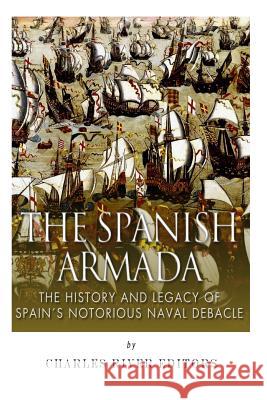The Spanish Armada: The History and Legacy of Spain's Notorious Naval Debacle » książka
The Spanish Armada: The History and Legacy of Spain's Notorious Naval Debacle
ISBN-13: 9781505272369 / Angielski / Miękka / 2014 / 44 str.
*Includes pictures
*Includes footnotes and a bibliography for further reading
"My loving people, we have been persuaded by some that are careful of our safety, to take heed how we commit ourself to armed multitudes for fear of treachery; but I assure you, I do not desire to live to distrust my faithful and loving people ... I know I have the body but of a weak and feeble woman, but I have the heart and stomach of a king, and of a King of England too, and think foul scorn that Parma or Spain, or any Prince of Europe should dare to invade the borders of my realm." - Queen Elizabeth I
On July 12, 1588, the legendary Armada started for the English channel. The Spanish plan was to take this invasion, led by the Duke of Parma, to the coast of southeast England, where they would be released to conquer Elizabethan England for the Spanish monarch and Catholic Christendom. The Armada included over 150 ships, 8,000 sailors and 18,000 soldiers, and it boasted a firepower of 1,500 brass guns and 1,000 iron guns. Just leaving port itself took the entire Armada two days.
As everyone who has been taught history now knows, the Armada was one of the most famous military debacles in history. Now whether it was simple mathematical miscalculation or plain bad luck, coupled with English fire ships assailing the Spanish ships, the Armada was decisively defeated. The Armada ultimately found its reluctant way home in awful conditions, having permanently lost over one third of the ships, and on the Irish coast, the Armada had suffered further losses.
Not yet knowing what had happened to the Armada, internal English gentry and militias sought to secure and protect England. This is when Elizabeth I consolidated her image as mother-protector of her people; inspecting her troops, long and to this day a regal tradition, at Tilbury on August 8, 1588, Elizabeth adorned herself in honor and rallied her people to fight the Spanish. When the Armada was indeed defeated, Elizabeth was hailed as a great savior of England, one who was willing to risk her own life to protect her children and her kingdom. In actuality, Elizabeth's luck had not been insignificant, but her preparations had also been immaculate, and indeed her pageantry had paid off. The monarch's procession to a service of thanksgiving at St Paul's Cathedral further solidified public support, and the vanquishing of the Armada became an unbelievably potent propaganda tool to warn away other sovereigns and kingdoms looking at England with desire.
Rightly or wrongly, the English people including many of Elizabeth's Catholic subjects who did not relish the idea of Spanish rule interpreted this victory as a manifestation of divine favor and of England's sacrosanct status under its virgin ruler. What was ignored in the middle of the celebrations was that the Anglo-Spanish War did continue and would continue until 1604. In reality, on the facts it seems that this conflict often did favor Spain. After all, the Spanish retained the Netherlands, thus hanging the scepter of possible invasion from that side.
The Spanish Armada looks at the ill-fated expedition from its origins to its demise. Along with pictures of important people, places, and events, you will learn about the Armada like never before, in no time at all.
Zawartość książki może nie spełniać oczekiwań – reklamacje nie obejmują treści, która mogła nie być redakcyjnie ani merytorycznie opracowana.











